




EXCELL NETWORK MAGAZINE SUMMER 2022 ISSUE Excell Network Magazine www.excellnetwork.org Excell Network Magazine www.excellnetwork.org


“I realized I had lived my whole life doing it my way,” she says.
“I figured that maybe this time I could try it their way and take their suggestions.”

“I knew that if I told them who I was working for I’d never be able to go back to the street. I could have died. My son could have died.”
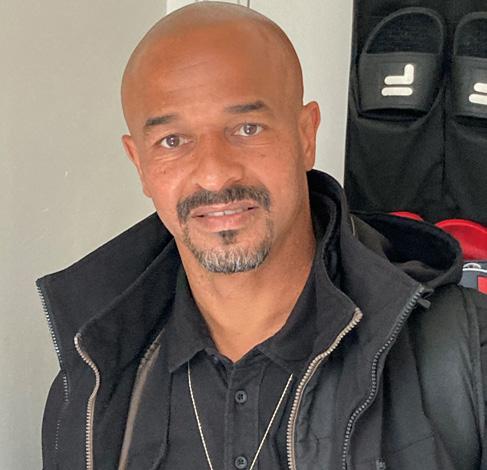
It puts me in a position to get the validation and recognition that I longed for as a kid.”



2 Excell Network Magazine | Summer 2022 Issue CONTENTS SUMMER 2022 ISSUE Excell Network Magazine www.excellnetwork.org magazine@excellnetwork.org Tel.: (415) 762.2300 P.O. Box: 320514 San Francisco, CA 94132 Excell Network is a 501(c)(3) charitable organization, EIN 90-0750851. All contributions are tax deductible. No goods or services are provided in exchange for any contribution.
ELIZABETH QUIROZ
JACKY BROWN
BE THE BEST THAT YOU CAN BE A message from the founder of Excell Network St. Agnes Church in San Francisco Celebrates the First Year of Excell Network’s Breakfasts Restorative Justice Excell Network Breakfast Celebrates 1-year Anniversary in San Francisco 4 3 7 8 10 13 • Jacky Brown • Dana Perrigan • Maureen Lundy • Michael Vezzali-Pascual • Valerie Schmalz • Julio Escobar
DAISY GONZALEZ
BE THE BEST THAT YOU CAN BE
Too often, we try to get our value out of what we do, out of how well we perform. We wonder if others think we are good enough, talented enough, strong enough, or successful enough. We believe that if we work harder, outperform our co-worker, or outperform our friend, we will feel good about ourselves; we live in trial mode, with the need to impress, thinking those around us are the opponent; sometimes we care more about our reputation than our character.

However, when we are sure that we belong to God and are precious in God’s sight, we have freedom to become what God created us to be. In the process of becoming, we discover our gifts and talents, and build a strong identity as God’s child. Then we are not competing with others. We know we are all equal and unique individuals, a masterpiece, made in the image of God, all living for only one purpose.
Lack of trust in God’s love and mercy cause our insecurity and we may seek validation in competing with others, in position and in possessions. Ultimately, we don’t have to prove anything to anybody, we are who we are and the best that we can be. We already have God’s love; we just need to walk in God’s path.
We congratulate the students of Excell Network because even with all the challenges they have, they have come out of that hole. Now they understand that being the best they can be in life means that they must live in the present and be themselves. Being themselves means that they understand their core strengths, have discovered their weaknesses, have developed a solid secure foundation in understanding their dignity as children of a loving Father, and are working on a personal and professional view of themselves. Each of them has developed a personal development plan to get them from where they have been to where they want to go. Our job is to support them on this journey. Thank you for investing in the students of Excell Network

The investment in Excell Network is a confirmation that all students, no matter their past, deserve the same opportunities to succeed
Con demasiada frecuencia, tratamos de obtener nuestro valor de lo que hacemos, de lo bien que nos desempeñamos. Nos preguntamos si otros piensan que somos lo suficientemente buenos, lo suficientemente talentosos, lo suficientemente fuertes o lo suficientemente exitosos. Creemos que, si trabajamos más duro, superamos a nuestro compañero de trabajo o superamos a nuestro amigo, nos sentiremos bien con nosotros mismos; vivimos en modo de prueba, con la necesidad de impresionar, pensando que los que nos rodean son el oponente, a veces nos importa más nuestra reputación que nuestro carácter.
Sin embargo, cuando estamos seguros de que pertenecemos a Dios y somos preciosos a la vista de Dios, tenemos libertad para convertirnos en lo que Dios nos creó para ser. En el proceso de convertirnos, descubrimos nuestros dones y talentos, y construimos una fuerte identidad como hijos de Dios. Entonces no estamos compitiendo con otros. Sabemos que todos somos individuos iguales y únicos, una obra maestra, hecha a imagen de Dios, todos viviendo para un solo propósito.
La falta de confianza en el amor y la misericordia de Dios causa nuestra inseguridad y podemos buscar la validación para competir con los demás, en la posición y en las posesiones. En última instancia, no tenemos que demostrar nada a nadie, somos lo que somos y lo mejor que podemos ser. Ya tenemos el amor de Dios; sólo tenemos que caminar en el camino de Dios.
Felicitamos a los estudiantes de Excell Network porque aún con todos los desafíos que tienen, han salido de ese agujero, ahora entienden que ser lo mejor que puedes ser en la vida significa que deben vivir en el presente y ser ellos mismos. Ser ellos mismos significa que entienden sus fortalezas centrales, han descubierto sus debilidades, han desarrollado una base sólida y segura para comprender su dignidad como hijos de un Padre amoroso y están trabajando en una visión personal y profesional de sí mismos. Cada uno de ellos ha desarrollado un plan de desarrollo personal para llevarlos desde donde han estado hasta donde quieren llegar. Nuestro trabajo es apoyarlos en este viaje. Gracias por invertir en los estudiantes de Excell Network

3 Excell Network Magazine | Summer 2022 Issue
SÉ LO MEJOR QUE PUEDAS SER
A message from the founder of EXCELL NETWORK
Un mensaje del fundador de EXCELL NETWORK

DAISY GONZALEZ
Four years ago, Daisy Gonzalez began the fight of her life.
It started following her latest arrest, and the stakes were high: Because of her record, she was looking at some serious prison time. There was also a good chance she would lose her three-year-old daughter, Mireyah.
“I just felt like such a big, big monster,” says Daisy. “It’s ugly and it’s crazy, but it’s the truth.”
Sitting in jail, Daisy had time to reflect on things. One of those things was the occasionally desperate, often chaotic and dangerous direction her life had taken since she was a little girl growing up in Dixon.
“We had a different kind of family ‘cause my family sold

drugs,” says Daisy. “It was a small town, and there was a lot of finger-pointing and judging.”
There was also trauma. At an early age, Daisy says, she saw her father being shot at by police. She also witnessed her mother being assaulted during a home invasion.
“That really messed me up,” she says. “But I never really got any help to deal with it. I was afraid I’d get my parents in trouble.”
Daisy found another way to escape the painful emotions she was dealing with. At the age of 12, she started numbing them by taking drugs. She also started running away from home, which seemed to help, too. Both coping mechanisms, however, led to arrests and probation throughout her high school years.
 By Dana Perrigan Writer | Journalist | Book Author
By Dana Perrigan Writer | Journalist | Book Author
Hace cuatro años, Daisy González comenzó la lucha de su vida.
Comenzó a raíz de su última detención, y había mucho en juego: debido a sus antecedentes, se enfrentaba a un tiempo de prisión importante. También existía la posibilidad de que perdiera a su hija de tres años, Mireyah.
“Me sentí como un monstruo muy grande”, dice Daisy. “Es feo y es una locura, pero es la verdad”.
Sentada en la cárcel, Daisy tuvo tiempo de reflexionar sobre algunas cosas. Una
de esas cosas era el rumbo ocasionalmente desesperado, a menudo caótico y peligroso que había tomado su vida desde que era una niña que crecía en Dixon.
“Teníamos un tipo de familia diferente porque mi familia vendía drogas”, dice Daisy. “Era un pueblo pequeño, y había muchos señalamientos y juicios”.
También había traumas. A una edad temprana, dice Daisy, vio cómo la policía disparaba a su padre. También fue testigo de cómo agredían a su madre durante un allanamiento de morada.
4 Excell Network Magazine | Summer 2022 Issue
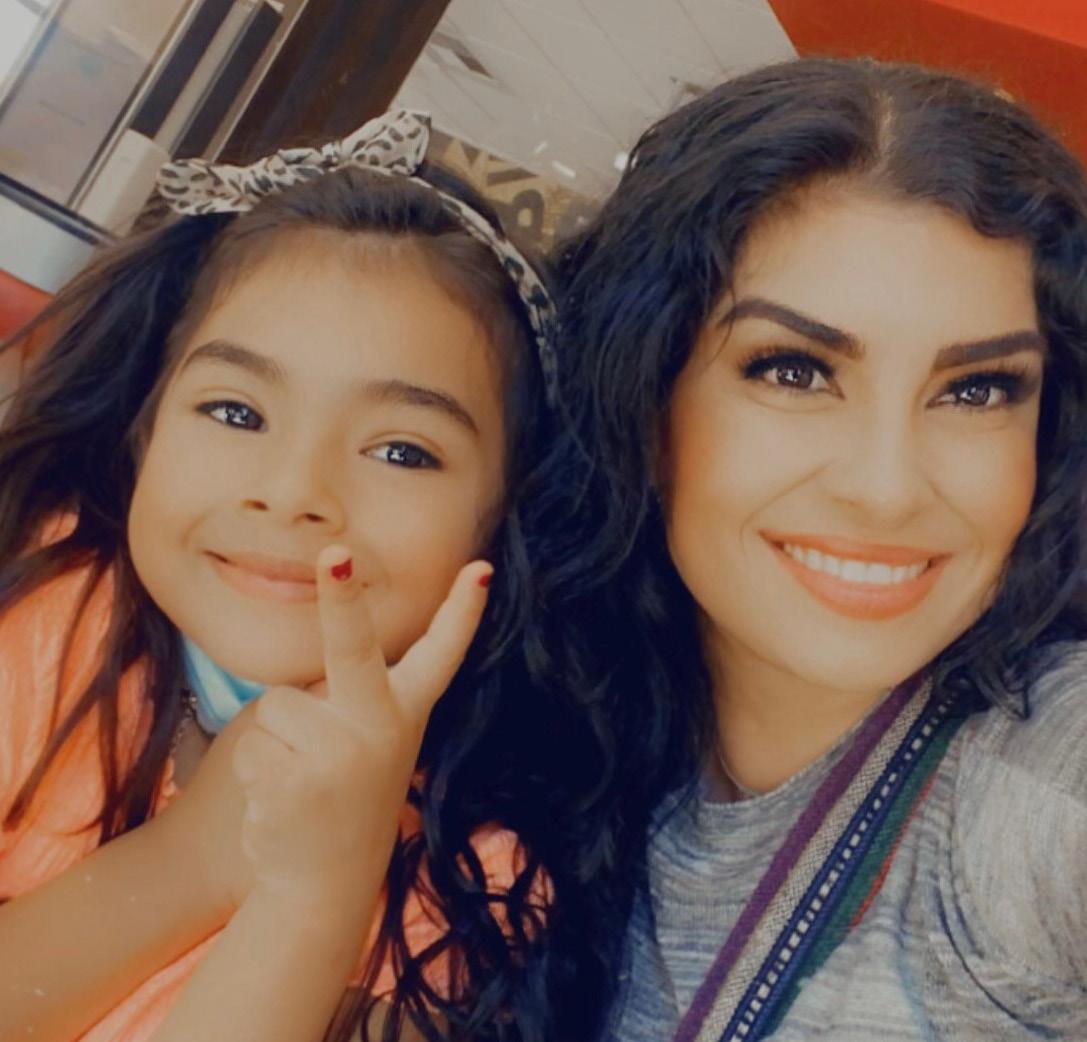
After spending her eighteenth birthday in jail for being caught with an open container, Daisy moved out on her own. After that, she was in and out of jail on a series of possession and sales charges.
It was a pattern that would continue for the next 13 years -- through the births of her three children. She made attempts to break the pattern, but none succeeded. Shortly after the birth of her second child, another conviction led to a two-year prison sentence.
Paroled to her mother, who was then living in Marysville, Daisy got a job in a food production business. She worked hard and eventually became a manager.
“Then I started drinking again,” she says. “And right after the drinking came the using. And everything went to shit so fast.”
Daisy lost her job. She lost her home. Eventually, she was arrested again. The 2018 arrest set up a high-stakes battle that would last three years. During that time, Daisy resolved to do everything she could to prove -- to the court
“Eso me afectó mucho”, dice. “Pero nunca recibí ayuda para afrontarlo. Tenía miedo de meter a mis padres en problemas”.
Daisy encontró otra forma de escapar de las dolorosas emociones con las que estaba lidiando. A los 12 años, empezó a adormecerlas tomando drogas. También empezó a escaparse de casa, lo que también parecía ayudarle. Sin embargo, ambos mecanismos de afrontamiento la llevaron a ser arrestada y a estar en libertad condicional durante sus años de instituto.
and to herself -- that she could be a good mother and productive citizen. And for the first time, she decided to seek help.
“I realized I had lived my whole life doing it my way,” she says. “I figured that maybe this time I could try it their way and take their suggestions.”
Her attorney arranged for her to receive treatment while she fought her case. She entered and completed an 11-month Salvation Army program which offered an array of services -- including a lot of one-on-one counseling. She attended A.A. and N.A. meetings, and got a sponsor. She took parenting classes and started having structured visits with her daughter.
Tras pasar su decimoctavo cumpleaños en la cárcel por haber sido sorprendida con un contenedor abierto, Daisy se fue a vivir sola. Después de eso, entró y salió de la cárcel por una serie de cargos de posesión y venta.
Fue un patrón que continuaría durante los siguientes 13 años, hasta el nacimiento de sus tres hijos. Intentó romper el patrón, pero no lo consiguió. Poco después del nacimiento de su segundo hijo, otra condena la llevó a dos años de prisión.
Concedida la libertad condicional a su madre, que entonces vivía en Marysville, Daisy consiguió un trabajo en una empresa de producción de alimentos. Trabajó duro y llegó a ser gerente.
“AND SO WITH SCHOOL I JUST WANT TO KEEP PUSHING FORWARD. I WANT TO GET THIS ASSOCIATE’S DEGREE AND THEN GO FROM THERE, AND JUST BE ABLE TO INSPIRE OTHER PEOPLE, LIKE YOUNGER PEOPLE, PEOPLE MY AGE EVEN, YOU KNOW, TO KNOW THAT WE CAN DO IT.”
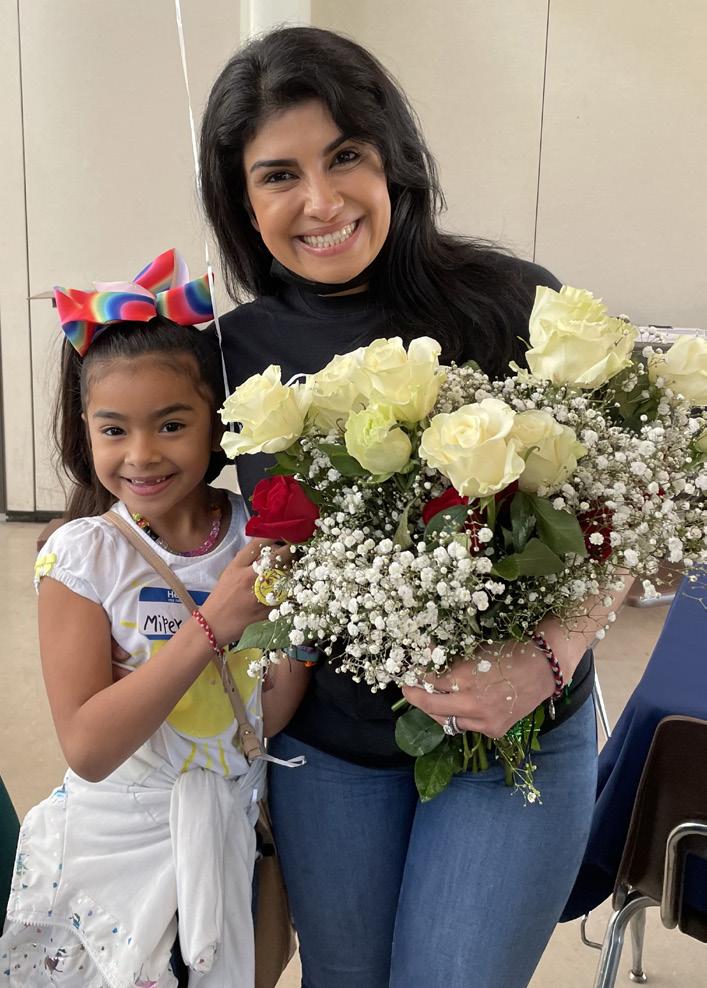
“Entonces empecé a beber de nuevo”, dice. “Y justo después de la bebida vino el consumo. Y todo se fue a la mierda muy rápido”.
Daisy perdió su trabajo. Perdió su casa. Finalmente, fue arrestada de nuevo. El arresto de 2018 puso en marcha una batalla de alto riesgo que duraría tres años. Durante ese tiempo, Daisy resolvió hacer todo lo posible para demostrar -al tribunal y a sí misma- que podía ser una buena madre y una ciudadana productiva. Y por primera vez, decidió buscar ayuda.
“Me di cuenta de que había vivido toda mi vida haciéndolo a mi manera”, dice. “Pensé que tal vez esta vez podría intentarlo a su manera y aceptar sus sugerencias”.
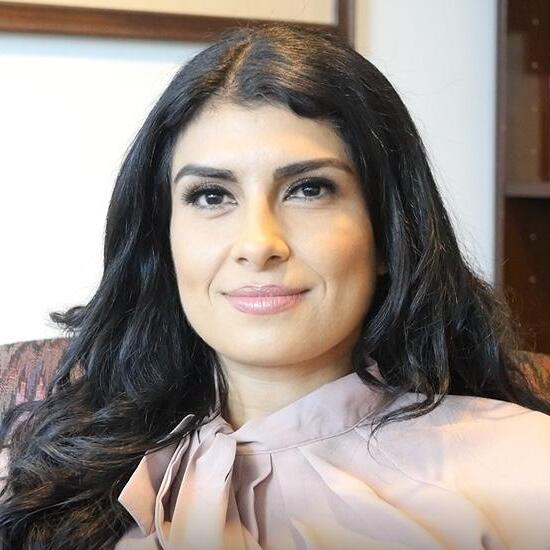

5 Excell Network Magazine | Summer 2022 Issue

Daisy was then accepted into Cameo House -- a local nonprofit dedicated to, among other things, helping homeless formerly incarcerated women and children.
“I love them,” says Daisy. “I give them credit for so much of my success. They slowly helped me learn how to live.”
Learning how to live meant learning how to feel and manage emotions in a healthy way. After running away from them for so long, taking increasing amounts of drugs to keep them at bay, it was a painful learning process. The help she received during the past four years was crucial to her success.
Learning how to live also meant work, education and worship. Daisy enrolled in City College of San Francisco. She got a job at a restaurant. She found a church, Abounding Grace, and made new friends.
She struggled through it all, knowing that when her case was finally decided there was a very good chance she would lose both her freedom and her daughter.
“It was an emotional roller coaster,” says Daisy. “But I just kept going and doing the next right thing. I knew God was with me. I could feel him every step of the way.”
When Daisy appeared in court, the judge was impressed with all she had accomplished. He sentenced her to a year of home detention and five years of probation. In family court, she was awarded custody of Mireyah.
“It just blew my mind,” says Daisy. “It was one of the happiest days of my life.”
Today, Daisy lives in San Francisco with her husband, Jorge, and Mireyah. She works as a case manager at Recovery Survival Network and is transferring to San Francisco State University, where she will major in social and behavioral sciences, with the goal of becoming a social worker.
“Life is good today,” she says.
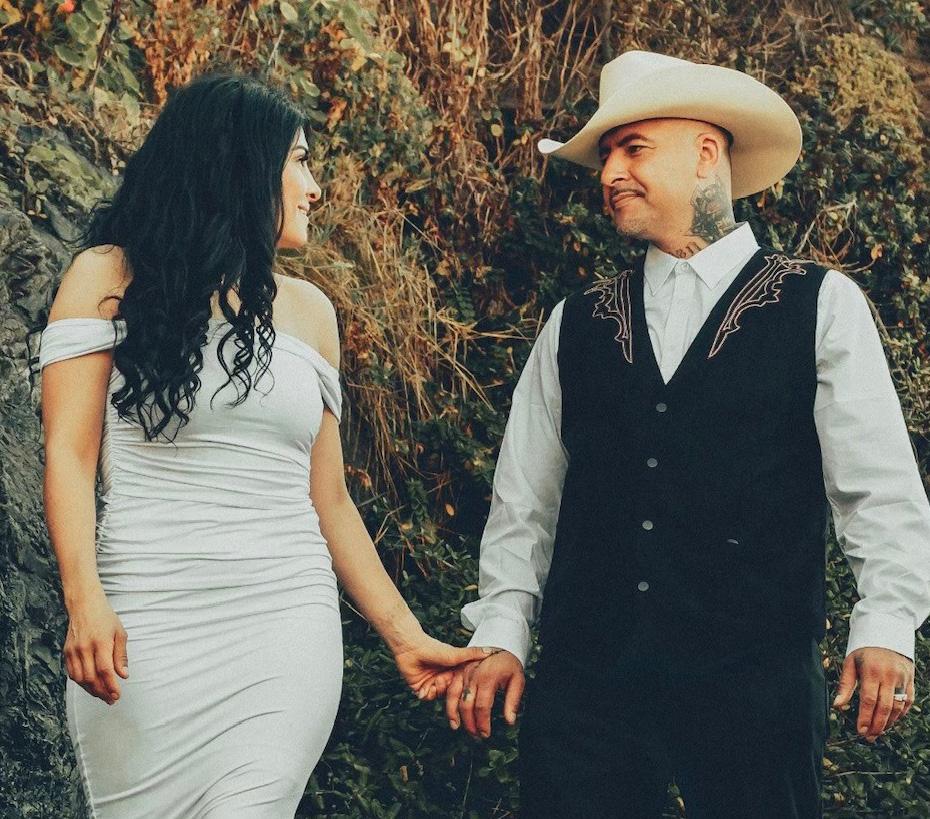
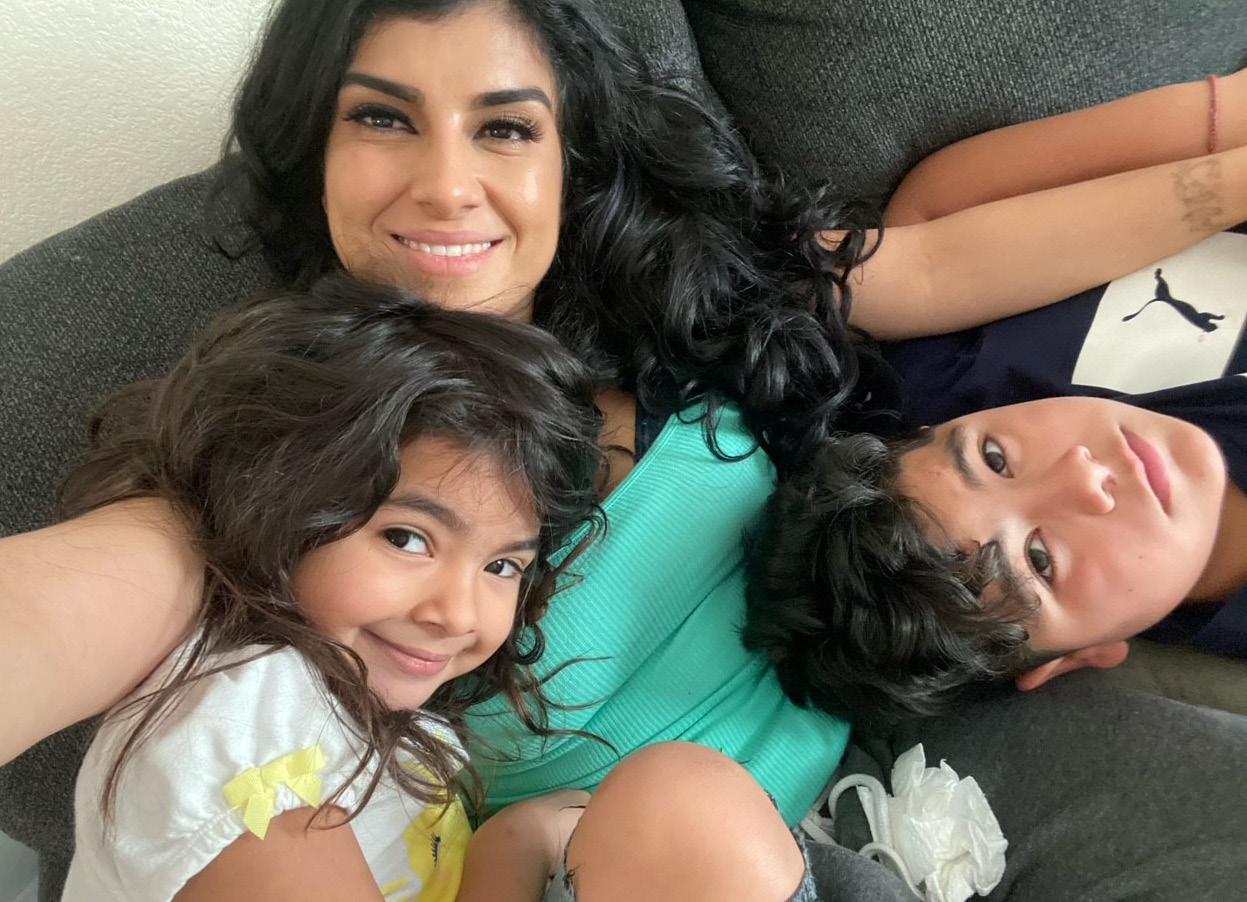
Su abogado se encargó de que recibiera tratamiento mientras luchaba por su caso. Entró y completó un programa de 11 meses del Ejército de Salvación que ofrecía una serie de servicios, incluyendo mucho asesoramiento individual. Asistió a reuniones de A.A. y N.A. y consiguió un padrino. Tomó clases de crianza y comenzó a tener visitas estructuradas con su hija.
Daisy fue aceptada en Cameo House, una organización local sin ánimo de lucro dedicada, entre otras cosas, a ayudar a mujeres y niños sin hogar que habían sido encarcelados.
“Me encantan”, dice Daisy. “Les atribuyo gran parte de mi éxito. Poco a poco me ayudaron a aprender a vivir”.
Aprender a vivir significaba aprender a sentir y gestionar las emociones de forma saludable. Después de huir de ellas durante tanto tiempo, tomando cantidades cada vez mayores de drogas para mantenerlas a raya, fue un proceso de aprendizaje doloroso. La ayuda que recibió durante los últimos cuatro años fue crucial para su éxito.
Aprender a vivir también significó trabajo, educación y culto. Daisy se matriculó en el City College de San Francisco. Consiguió un trabajo en un
restaurante. Encontró una iglesia, Abounding Grace, e hizo nuevos amigos.
Luchó por todo, sabiendo que cuando su caso se decidiera finalmente había una gran posibilidad de que perdiera tanto su libertad como a su hija.
“Fue una montaña rusa emocional”, dice Daisy. “Pero seguí adelante y haciendo lo correcto. Sabía que Dios estaba conmigo. Podía sentirlo en cada paso del camino”.
Cuando Daisy compareció ante el tribunal, el juez quedó impresionado por todo lo que había logrado. La condenó a un año de arresto domiciliario y a cinco años de libertad condicional. En el tribunal de familia, se le concedió la custodia de Mireyah.
“Me sorprendió”, dice Daisy. “Fue uno de los días más felices de mi vida”.
Hoy, Daisy vive en San Francisco con su marido, Jorge, y Mireyah. Trabaja como gestora de casos en Recovery Survival Network y se está trasladando a la Universidad Estatal de San Francisco, donde se especializará en ciencias sociales y del comportamiento, con el objetivo de convertirse en trabajadora social.
“La vida es buena hoy”, dice.
6 Excell Network Magazine | Summer 2022 Issue
ST. AGNES CHURCH IN SAN FRANCISCO CELEBRATES THE FIRST YEAR OF EXCELL NETWORK’S BREAKFASTS
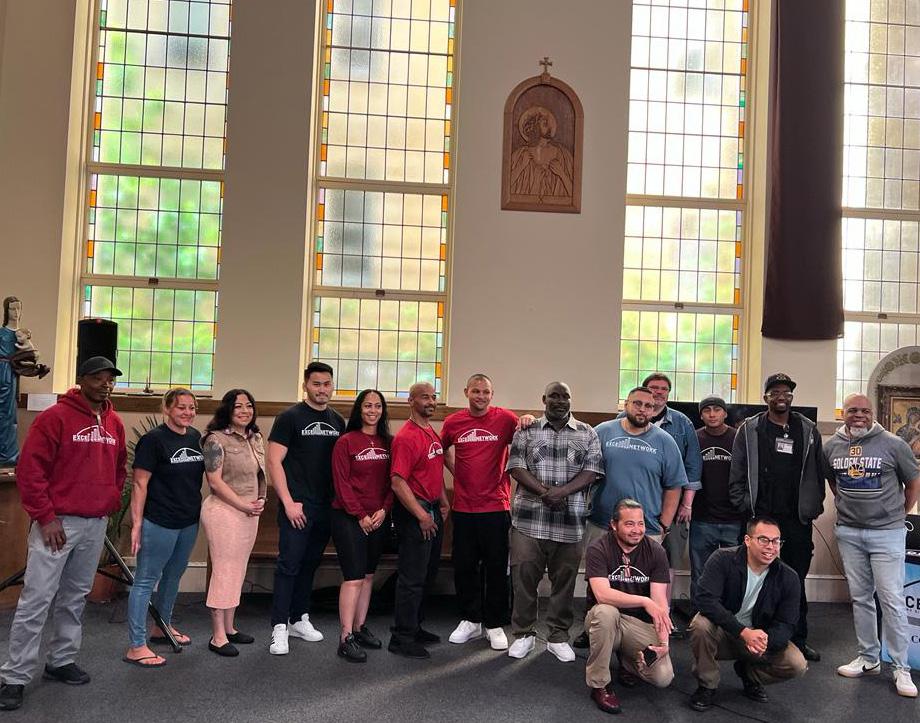
On the morning of the second Saturday of every month, a group of people sit down at tables set up in the back of St. Agnes Church in San Francisco and have breakfast together. It’s been going on for a year now and, judging from some of the comments of those in regular attendance, more than food is being served at these gatherings.
“They changed my life,” says one.
“They give me hope,” says another.
“They let me know that change is possible,” says a third.
Designed to provide spiritual and emotional as well as physical sustenance, the monthly breakfasts are an important part of Excell Network an innovative program dedicated to, in the words of its founder, Julio Escobar, “restoring the dignity of people returning home from prison while motivating them to reach their full potential.”
While those accepted into the program receive some financial assistance to help them achieve their educational goals, says Escobar, Archdiocese of San Francisco Restorative Justice coordinator, the monthly breakfasts offer them

something else.
“It gives them an opportunity to share their stories in public,” he says, “and while doing so, exposing them to an audience the parishioners of a particular church.”
Escobar says he got the idea for the monthly breakfasts from John 21:12, in which Jesus appears to his disciples at the Sea of Tiberias and invites them to “Come and have breakfast.” Looking for a church to host the breakfast, he then approached Fr. George Williams, S.J., Pastor of St. Agnes Church.
“I thought it was a great idea and I immediately offered to host the breakfasts at St. Agnes,” says Fr. George. Having served in detention ministry for 27 years 10 of which was as a chaplain at San Quentin Fr. George says he understands the profound need for effective re-entry programs for those who have been incarcerated.
“I think the best part of it has been getting to hear the stories of the young people who have come out of the criminal justice system and are doing such good things,” he says. “You don’t see that often enough.”
Fr. George remembers a few of the students from his days
at San Quentin, and he is gratified to learn they have made such positive changes in their lives.
“I can’t say enough good things about Julio,” he says. “He’s just out there actually doing the work of the Gospel.” Prior to founding Excell Network in the fall of 2020, Escobar served for 17 years as executive director of Communidad San Dimas a nonprofit which ministers to youth in the juvenile justice systems in San Francisco, San Mateo and Alameda counties. The central idea of fostering a sense of community among volunteers and students, he says, was a key element of the Communidad San Dimas ministry. The one-and-a-half-hour breakfast format, says Escobar, is all about building community. Following an opening prayer, students and parishioners sit down together to a catered breakfast. After each member of the audience introduces themselves, an Excell Network student tells his or her story, followed by a question and answer period. The remaining 30 minutes is reserved for networking.
Volunteer Melissa Vlach says she has enjoyed meeting the students and hearing their stories during the past year. “I find it inspiring,” she says. “So many of the students
they’ve faced so many challenges. It would be easy for them to become bitter, but they use the pain they’ve been through to help others.” Vlach, who works with Escobar as a social action and digital media coordinator at the Archdiocese, produces videos of the students that are featured on the Excell Network website and writes for the magazine.
Volunteer Jan Potts, who uses her expertise as Communications Director for the Sisters of The Presentation to advise Escobar on communication matters, says she has also been inspired from hearing the stories of the students.
“It’s very compelling,” she says. “When I’m there, I’m so aware of the privilege of hearing their stories. Their openness, their courage, is contagious. I always talk about it when I go home.”
An active parishioner at St. Agnes, Robert Keller heard about the program while taking courses in restorative justice and decided to volunteer. He hopes to encourage more parishioners to attend the monthly gatherings.
“I think it’s great,” he says. “It’s one of the things that give us an example of the success of restorative justice. It’s very inspiring plus it’s a good, inexpensive breakfast.”
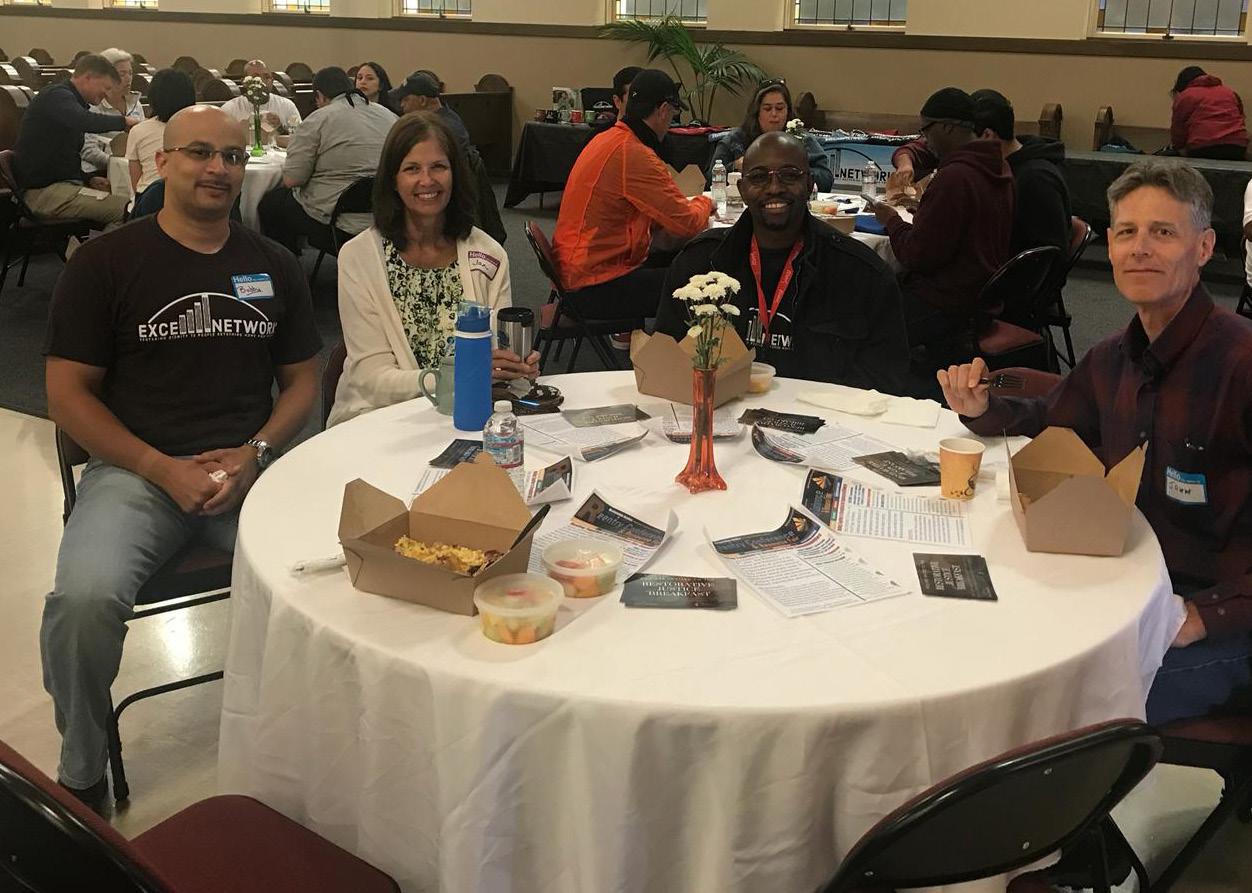
7 Excell Network Magazine | Summer 2022 Issue
ELIZABETH QUIROZ
My name is Elizabeth Quiroz and participating in restorative justice breakfasts with Excell Network has literally changed my life. I have discovered that many formerly incarcerated students, like myself, are striving for a better life. Moreover, they do not stop there; they work to give back to the community while using their pain for purpose. Please join us in supporting the Excell Network’s mission and vision of changing lives.
OMAR BREEDLOVE
The Restorative Justice Breakfast gives me hope. When I am there, I feel welcomed, and I am not judged for my past. Instead, I am recognized for my accomplishments and supported as I continue my journey to a successful life. Also, to be with others that have been through similar experiences is very empowering. It lets me know that I am not alone, and that change is possible. I thank God for the blessings that have been bestowed upon me which includes being a part of the community that continues to grow at the Restorative Justice Breakfasts.
NICOLE BRONSON
The Excell Network breakfasts are a time to build new communities and bridge the gaps by broadening each other’s perspectives. I believe the community heals and begins itsrestoration when we share our testimonies and examine the state of our past and existing communities. We have the chance and opportunity to genuinely connect, change the course, and brighten the future for
the next generations that are following and looking up to us. It is a time to culminate resources for a greater purpose and invest positively for those reentering our communities. It is a time to practice the love of God and display what compassion, redemption, and brotherhood exemplify. The Excell Network is a time for fellowship, networking, and unification.
BOBBY JONES - HANLEY
“The Restorative Justice Breakfasts are an integral part of Excell Network’s mission. Not only do they help build the leadership and public speaking skills of students, they create a space for building empathy, understanding and community for all who attend. Each month students are able to progress in their personal and professional journey while attendees are able to engage with students, learning from their stories and seeing firsthand the impact of their support. I personally love attending the breakfast and feel they are the glue that holds the program together.”
DAISY GONZALEZ
The Excell Breakfasts have made it possible for me to be able to connect with other students with similar backgrounds to mine. This might not seem like a huge deal; however, to me it is because it creates community and gives hope because it shows others that we can move forward and move up. The first time I spoke was in Belmont and I was so very nervous. I had mixed feelings about sharing my story with a room full of people that I did not know. The experience was beautiful, Julio was there
so I felt better once I started speaking and little by little the words just came out. I could sense that the people that were there genuinely cared. It was a great day, speaking about my journey was healing. The parishioners received my story with so much love. I think these breakfasts are important because they bring the people that are helping together with those they help. It allows them to put a face and a story to a name. Thank you for making the breakfast possible.
JOHN CUNNINHAM
Congratulations Excell Network on our 1-year Anniversary!!!!
I want to thank Julio for having the vision of supporting those impacted by the criminal justice system in our communities. The monthly breakfasts have inspired, encouraged, and enriched my life.
Hearing the testimonies of my brothers and sisters has blessed me and drawn me closer to them all. Meeting those in the community who come out each month to support us is refreshing and gives me renewed hope in humanity. Shout out to Pastor George, the St Agnes Church, Pastor Angel, and the St. Mark’s Church for extending their generous and gracious hospitality to Excell Network. Looking forward to year 2 and beyond!
CHRISTI GROVE
The monthly Breakfasts for me are a place to be inspired. It brings us together in a safe and supportive environment where we can share, learn and be inspired by our fellow members. We are a group
of formerly incarcerated individuals with a past of hopelessness, trauma and a life not worth living. Together we are listening to one another, supporting each other for a brighter future, and showing each other the obstacles around us. Where we started, where we are going and how we are accomplishing a better life beyond our wildest dreams. Being inspired and having hope is what this is for me.
WALTER HIDALGO
For me Excell Network is a place where I can share part of my life. There is no judgement at all, for what happened in the past; with Excell Network as my support team I can move forward. I have been surprised for how this program focus in my goals; it is like a reminder for what is coming next. As Excell Network does...I do believe that Education plays a fundamental roll in our life, it is like to have an opportunity to re-build our future for a better society.
JACKY BROWN
My parents taught me to be loyal and committed to our family no matter what. Of the 8 members of our family, my mother and I survive and thrive for the rest. Today, everyone around me is my family. Why, cause GOD said we are all created in HIS image. For me that is a spiritual connection. I reconnected with my love for becoming a better person, spiritually, emotionally, mentally, and physically .My parents taught me to think before I speak. I have an abundance of energy and it gives me satisfaction using it to help others and myself.

R ESTORATIVE JUSTICE EXCELL CELEBRATES 1-YEAR ANNIVERSARY

EXCELL NETWORK BREAKFAST
ANNIVERSARY IN SAN FRANCISCO
JOSEPH KRAUTER
I have an almost unstoppable thirst for learning. Most often, if I am not learning something I feel as if I am drowning. Excell Network blessed me with the resources to keep learning. I am enrolled in two different schools studying my most intense passions: IT for a great stabilizing career, and Creative writing to pursue my dream of becoming an accomplished author. This journey has not been easy but it has given me a new aspect of faith and determination that I did not have before. I do not believe that I would have been able to come this far through the nightmare of parole and reintegrating into society without the support from Excell Network. Thank and Bless you all for that you have done for me.
MIGUEL INFANTE
Deo gratias, I recently had the privileged to attend a retreat presided by Father Greg Boyle SJ and the theme of the retreat was “Love is God’s religion”. The Excell network’s objective of education during reentry while reducing recidivism in collaboration with the Catholic values of inclusion, reconciliation and redemption enhances the healing process that is vital to rebuild tarnished relationships and transform communities. Sometimes in life, we are not dealt a fair hand whether it be environmental or socioeconomic, yet despite these challenges one must learn to procure balance physically, mentally and
spiritually. The healing process that is expressed at the breakfast demonstrates the vulnerability of the disenfranchised and most importantly a community willing to nurture and continue with God’s work in the metaphysical approach. I would like to commend the Excell network for its continued success and remind everyone that God’s work is perpetual and much is left to be done.
ADRIAN LEWIS
My experience with the Excell Network breakfast has been amazingly positive and supportive. What Julio has created with the Excell Network breakfast is a sense of community particularly for those of us like me who are returning to society from incarceration. It also connects those who are in the community with formerly incarcerated persons and gives them a view into who we are today and gives us a sense that we are not the sum total of the crimes we committed. We made some horrible decisions in our past but that past does not define who we are as men and women. Moving forward through the Excell Network and participating in a breakfast fundraiser I have met many positive career oriented people who have helped me along my journey of recovery, self-discovery and employment. The breakfast also allows us to share our stories and experiences which is extremely healing and cathartic to release some of the trauma by talking about it. I plan to stay connected to the Excell Network and to continue to share my story
and journey to help create change and pave the way for those coming after me.
TRUNG TONG
My breakfast experience has been helpful because I am able to connect with my formerly incarcerated community. These brothers and sisters share similar experiences with me and it helps to share information and struggles with one another. I am happy to be able to lean on them when times are difficult. Moreover, it has been a great learning opportunity to speak in front of an audience about my story. I learned the importance of listening to my body regarding trauma and creating a safe space to share my traumas.
JESSY MARTINEZ
Every month, I look forward to attending Excell’s bi-monthly breakfasts because I am able to interact with friends and meet the most compassionate empathetic people. I am so busy with work and school, so these breakfasts allow me to take a break and connect with friends. The stories that are shared by others are also very inspiring to me, especially as a Returned Citizen. It reminds me that I am not on my own, there is support available, and I also have the capacity to help someone else.
KRIS SOSA
Our Restorative Justice breakfasts are an essential part of the Excell Network family because it creates a supportive community that fosters unity and solidarity. Students are able to help
change the narrative and remove the stigmas society places on formerly incarcerated individuals by sharing their stories, their trials and tribulations, and their transformations. It is a time when donors, students, and other religious community members can come together, share a meal, network for opportunities, and establish life-long connections and friendships.
CALEB ADKINS
The Excell Network breakfasts to me is community in one word unity change somewhere where I can come, and I know that there are like-minded people who are there with me who are going through the same struggles or who are willing to hear my struggles and help me where I need help Excel breakfasts are changing how people look at police reform and criminal justice that is what Excel breakfasts are to me
ALLEN BUSTOS
The “Excell Network” breakfasts have been a transformative experience for me. Being in community with my peers and supports provides me inspiration to stay motivated in this journey to become an educator and lifelong learner. The stories of my peers allow me to remain humble and I value the interactions with the parishioners! Considering the conditions and traumas we’ve experienced, celebrating our accomplishments and achievements on this platform shows the community that change is collaborative.

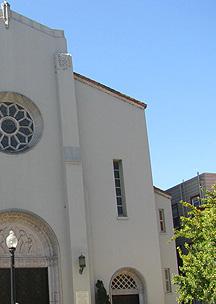
ELIZABETH QUIROZ
 By Dana Perrigan Writer | Journalist | Book Author
By Dana Perrigan Writer | Journalist | Book Author
“I KNEW THAT IF I TOLD THEM WHO I WAS WORKING FOR I’D NEVER BE ABLE TO GO BACK TO THE STREET. BUT IT NEEDED TO HAPPEN. I COULD HAVE DIED. MY SON COULD HAVE DIED.”
Elizabeth Quiroz believes in miracles. She has absolutely no doubt that they exist. But if a shred of doubt ever does creep in, she has a sure-fire remedy to send it packing: All she has to do is reflect back on her life.
Born in San Francisco, Elizabeth was four when her parents separated. She moved to Sacramento to live with her grandmother -- a cruel and abusive woman, she says -- who regularly beat her. Elizabeth hid in a closet during her grandmother’s all-night parties, lived in constant fear and was sexually assaulted.
“Because of that early trauma,” she says, “I became sexually active at a very young age.”
Later, after returning to live with her mother, the abuse continued. Elizabeth began cutting her arms and thinking about suicide.
“I wanted someone to love

me,” she says. “And I felt that by hurting myself someone would notice me. It was a coping mechanism.”
After her mother physically abused her by pouring chemicals on her and in her mouth, Elizabeth called the police. They handed her the business card of a social worker. After seeing the social worker, she was placed in a foster home.
Unhappy with the conditions there, Elizabeth took off. She ran to her father in San Francisco and pleaded for help. He took her in, but his alcoholism, she says, made it impossible for him to protect and care for his vulnerable daughter.
So when a tatted and bald 27-year-old man presented himself as an appropriate boyfriend for 15-year-old Elizabeth, her father gave him his blessing. The man turned out to be a member of a prison gang who made his living by selling drugs and exploiting young girls.

Elizabeth Quiroz cree en los milagros. No tiene ninguna duda de que existen. Pero si una pizca de duda aparece, tiene un remedio infalible para disiparla: Todo lo que tiene que hacer es reflexionar sobre su vida.
Nacida en San Francisco, Elizabeth tenía cuatro años cuando sus padres se separaron. Se trasladó a Sacramento para vivir con su abuela -una mujer cruel y abusiva, según ella- que la golpeaba con frecuencia. Elizabeth se escondía en un armario durante las fiestas nocturnas de su abuela, vivía con miedo constante y sufría agresiones sexuales.
“Debido a ese trauma temprano”, dice, “me volví sexualmente activa a una edad muy temprana”.
Más tarde, tras volver a vivir
con su madre, los abusos continuaron. Elizabeth empezó a cortarse los brazos y a pensar en el suicidio.
“Quería que alguien me quisiera”, dice. “Y sentía que haciéndome daño alguien se fijaría en mí. Era un mecanismo de supervivencia”.
Después de que su madre la maltratara físicamente vertiendo productos químicos sobre ella y en su boca, Elizabeth llamó a la policía. Le dieron la tarjeta de visita de un trabajador social. Después de ver a la trabajadora social, la colocaron en un hogar de acogida.
Descontenta con las condiciones de ese lugar, Elizabeth se marchó. Corrió hacia su padre en San Francisco y le pidió ayuda. Él la acogió, pero su alcoholismo, dice, le impedía proteger y cuidar a su vulnerable hija.
10 Excell Network Magazine | Summer 2022 Issue
“He began grooming me,” says Elizabeth. “He told me how beautiful I was. He took me to motel rooms. He gave me drugs.”
Soon, Elizabeth was hanging out at 16th and Mission streets, holding drugs for her boyfriend. He forbid her to look into other men’s eyes and would beat her when she did. It broke her heart when she learned he was seeing other girls.
“But I stayed with him,” she says. “I felt like I had nowhere else to turn. I was just surviving. I wasn’t living -- that’s for sure.”
When her boyfriend was arrested and jailed, an older woman took over for him. She told Elizabeth she had to earn money for her boyfriend. She took her to 17th and Capp Street, where she sold Elizabeth to men for sex.

Following an arrest when she was 16, Elizabeth was committed to a group home. She ran away before being sent there and spent the next three years on the run, living under different aliases.
“At that point,” she says, “I was Beth the drug dealer -- or I was Sabrina when I was sold to men.”
Life on the street continued unchanged for several years. Occasionally, Elizabeth was arrested for possession and sales, but she always took up where she left off when she got out of jail. She had a child, but that didn’t alter her course.

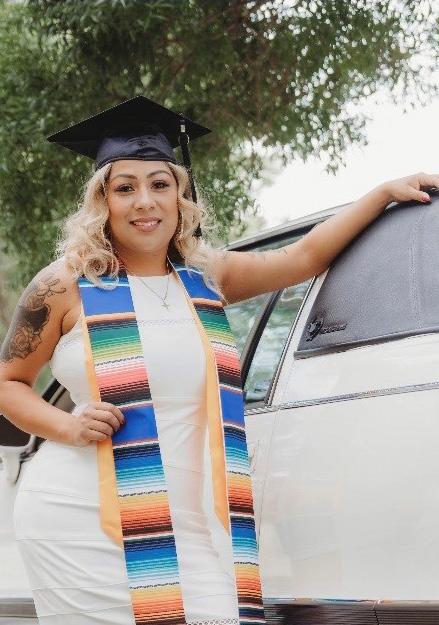
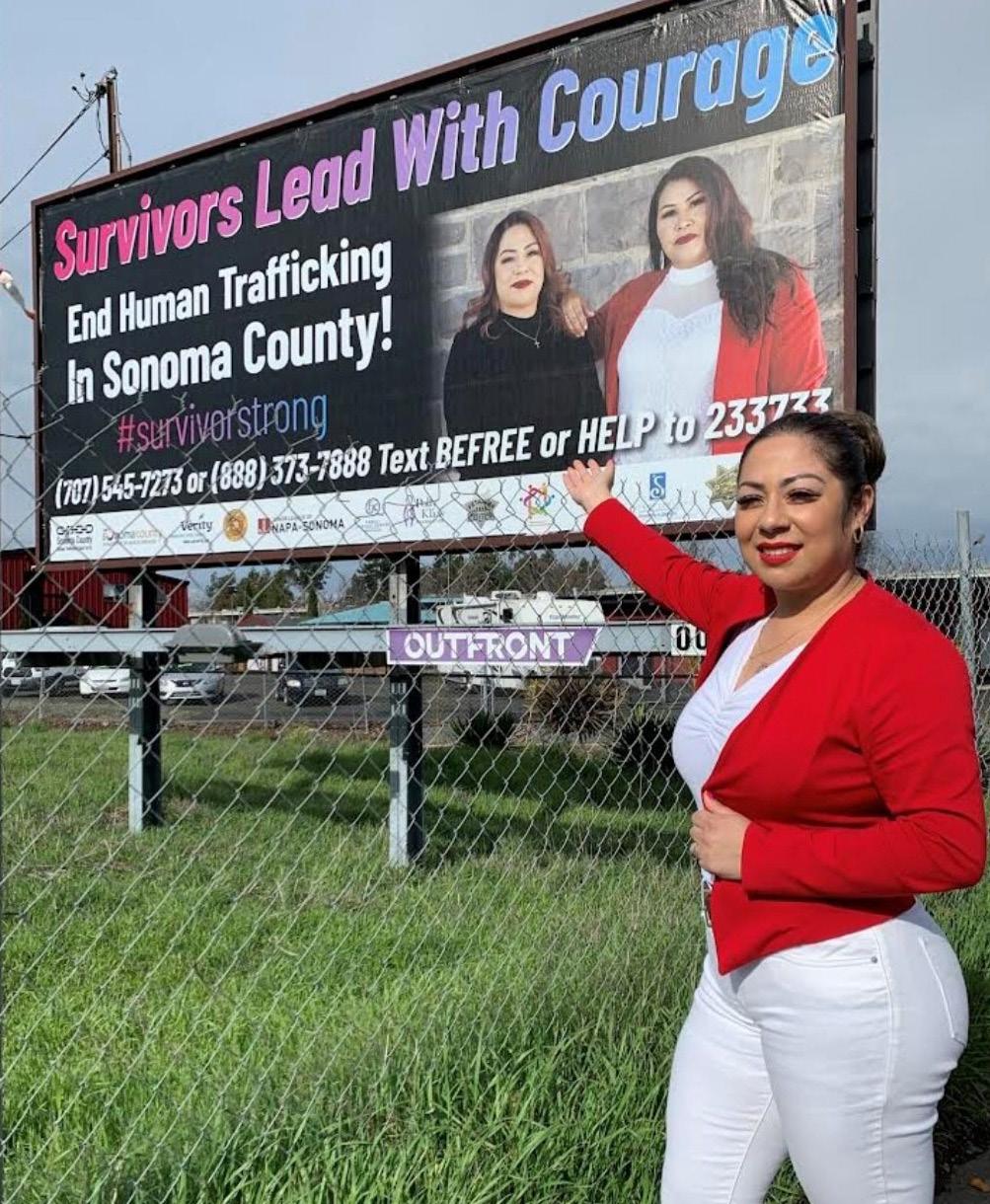
Así que cuando un hombre de 27 años, tatuado y calvo, se presentó como un novio apropiado para Elizabeth, de 15 años, su padre le dio su bendición. El hombre resultó ser un miembro de una banda de la cárcel que se ganaba la vida vendiendo drogas y explotando a chicas jóvenes.
“Empezó a prepararme”, dice Elizabeth. “Me decía lo guapa que era. Me llevaba a habitaciones de motel. Me dio drogas”.
Pronto, Elizabeth pasaba el rato en las calles 16 y Mission, guardando drogas para su novio. Él le prohibía mirar a los ojos a otros hombres y la golpeaba cuando lo hacía. Se le rompió el corazón cuando se enteró de que se veía con otras chicas.
“Pero me quedé con él”, dice. “Sentía que no tenía otro lugar al que acudir. Sólo sobrevivía. No estaba viviendo, eso es seguro”.
Cuando su novio fue detenido y encarcelado, una mujer mayor le sustituyó. Le dijo a Elizabeth que tenía que ganar dinero para su novio. La llevó a la calle 17 y Capp, donde vendió a Elizabeth a hombres para tener sexo.
Tras un arresto cuando tenía 16 años, Elizabeth fue internada en un hogar de grupo. Se escapó antes de ser enviada allí y pasó los
11 Excell Network Magazine | Summer 2022 Issue
Eventually, it would. Set up by an informant, Elizabeth was arrested. Detectives gave her an ultimatum: Either she told them who she worked for, or she would be going to prison for a very long time. Fearing she would lose her son, she decided to cooperate.
“I knew that if I told them who I was working for I’d never be able to go back to the street. But it needed to happen. I could have died. My son could have died.”
Elizabeth was then sentenced to a five-year prison term behind bars, where a transformation began to take place.
Through a chaplain, she says, she “started to learn what love was really like.” Through a program called Choices and others, she learned about drug and alcohol addiction, and other self-destructive behaviors. She became interested in education and earned her G.E.D.
“That was huge for me,” she says.
Since being released, education has been a priority. After graduating from Santa Rosa Junior College, Elizabeth transferred to Sonoma State University, where she earned a bachelor’s degree in sociology. Currently, she is studying for her master’s degree online at Arizona State University.
Now married, Elizabeth lives in Santa Rosa with her husband and son and four step-children. She works as an investigator at Dependency Legal Services, helping parents and children navigate the child welfare system.
Elizabeth wants to use her education -- as well as her experience -- to serve others. She co-founded Redemption House of the Bay Area and plans to open a safe house for trafficking victims. She has written a memoir, “Purified in the Flames,” which will be published this spring.
“It’s a miracle that I’m in the place in my life I’m at right now,” says Elizabeth. “God has given me quadruple of what was stolen from me over the years.”
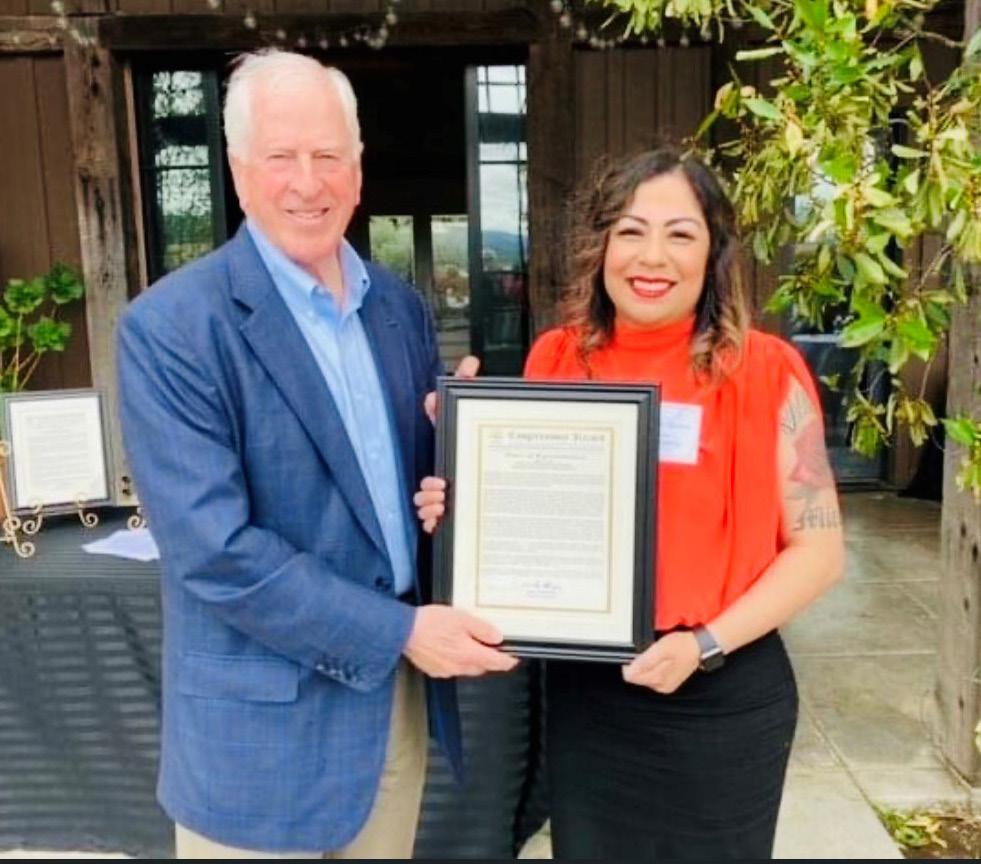
siguientes tres años huyendo, viviendo bajo diferentes alias.
“En ese momento”, dice, “era Beth la traficante de drogas... o era Sabrina cuando me vendían a los hombres”.
La vida en la calle continuó sin cambios durante varios años. De vez en cuando, Elizabeth era detenida por posesión y venta, pero siempre retomaba su vida donde la había dejado al salir de la cárcel. Tuvo un hijo, pero eso no alteró su rumbo.
Con el tiempo, lo haría. Una trampa de un informante hizo que Elizabeth fuera arrestada. Los detectives le dieron un ultimátum: o les decía para quién trabajaba, o iría a la cárcel durante mucho tiempo. Temiendo perder a su hijo, decidió cooperar.
“Sabía que si les decía para quién trabajaba no podría volver a la calle. Pero tenía que hacerlo. Podría haber muerto. Mi hijo podría haber muerto”.
Elizabeth fue entonces condenada a cinco años de prisión entre rejas, donde empezó a producirse una transformación.
A través de un capellán, dice, “empezó a aprender lo que era realmente el amor”.
A través de un programa llamado Choices y otros, aprendió sobre la adicción a las drogas y al alcohol, y otros comportamientos autodestructivos. Se interesó por la educación y obtuvo su G.E.D.
“Eso fue muy importante para mí”, dice.
Desde que fue liberada, la educación ha sido una prioridad. Tras graduarse en el Santa Rosa Junior College, Elizabeth se trasladó a la Universidad Estatal de Sonoma,

Ahora casada, Elizabeth vive en Santa Rosa con su marido, su hijo y sus cuatro hijastros. Trabaja como investigadora en los Servicios Legales de Dependencia, ayudando a los padres y a los niños a navegar por el sistema de bienestar infantil.
Elizabeth quiere utilizar su formación, así como su experiencia, para servir a los demás. Es cofundadora de Redemption House of the Bay Area y tiene previsto abrir una casa de acogida para las víctimas de la trata. Ha escrito unas memorias, “Purified in the Flames”, que se publicarán esta primavera.
“Es un milagro que me encuentre en el lugar de mi vida en el que estoy ahora”, dice Elizabeth. “Dios me ha dado el cuádruple de lo que me robaron durante años”.

12 Excell Network Magazine | Summer 2022 Issue
Ariver of violence has run through much of Jacky Brown’s life.
His first memory of it comes from an incident that took place when he was five years old: He was sitting at the breakfast table at home one morning. His father entered the room, became enraged when he saw that there was no butter on his pancakes, and started beating his wife.
Years later, Jacky -- who had always wondered why he had not run to comfort his mother that morning -- asked her about it. She told him that the beatings had been going on since Jacky was three, and that she had always assured him that it was OK, it was all right.
“Her fear was that I wouldn’t have a father,” says Jacky. “That let me know that it was
OK to use anger and violence to control my life.”
There were other things Jacky learned growing up in Oakland with his parents and five siblings.
“My parents taught me how to avoid the law, which meant that you didn’t bring them home when you were caught,” he says, “They were pretty much drug lords and they ran an identity theft operation in the ‘80s.”
Avoiding the law turned out to be problematic. Jacky dropped out of school in the seventh grade and started selling drugs. From the age of 13 on, he was frequent resident at Alameda County’s juvenile hall. After running away twice from the county’s boy’s ranch, he was sentenced to a California Youth Authority facility at the age of 18.

 By Dana Perrigan Writer | Journalist & Book Author
By Dana Perrigan Writer | Journalist & Book Author

Jacky Brown
“I began to realize who I really was. I realized that the real me — the essence — is the spirit. I saw that what I was here for was to evolve spiritually and achieve a spiritual resurrection.”
JACKY BROWN
Un río de violencia ha recorrido gran parte de la vida de Jacky Brown
Su primer recuerdo proviene de un incidente que tuvo lugar cuando tenía cinco años: Una mañana estaba sentado en la mesa del desayuno en casa. Su padre entró en la habitación, se enfureció al ver que no había mantequilla en sus tortitas y empezó a golpear a su mujer.
Años más tarde, Jacky -que siempre se había preguntado por qué no había corrido a consolar a su madre aquella mañana- le preguntó por ello. Ella le dijo que las palizas se sucedían desde que Jacky tenía
tres años, y que siempre le había asegurado que estaba bien, que no pasaba nada.
“Su miedo era que yo no tuviera un padre”, dice Jacky. “Eso me hizo saber que estaba bien usar la ira y la violencia para controlar mi vida”.
Hubo otras cosas que Jacky aprendió al crecer en Oakland con sus padres y cinco hermanos.
“Mis padres me enseñaron a evitar la ley, lo que significaba que no los traías a casa cuando te pillaban”, dice. “Eran unos señores de la droga y dirigían una operación de robo de identidad en los años 80”.
13 Excell Network Magazine | Summer 2022 Issue
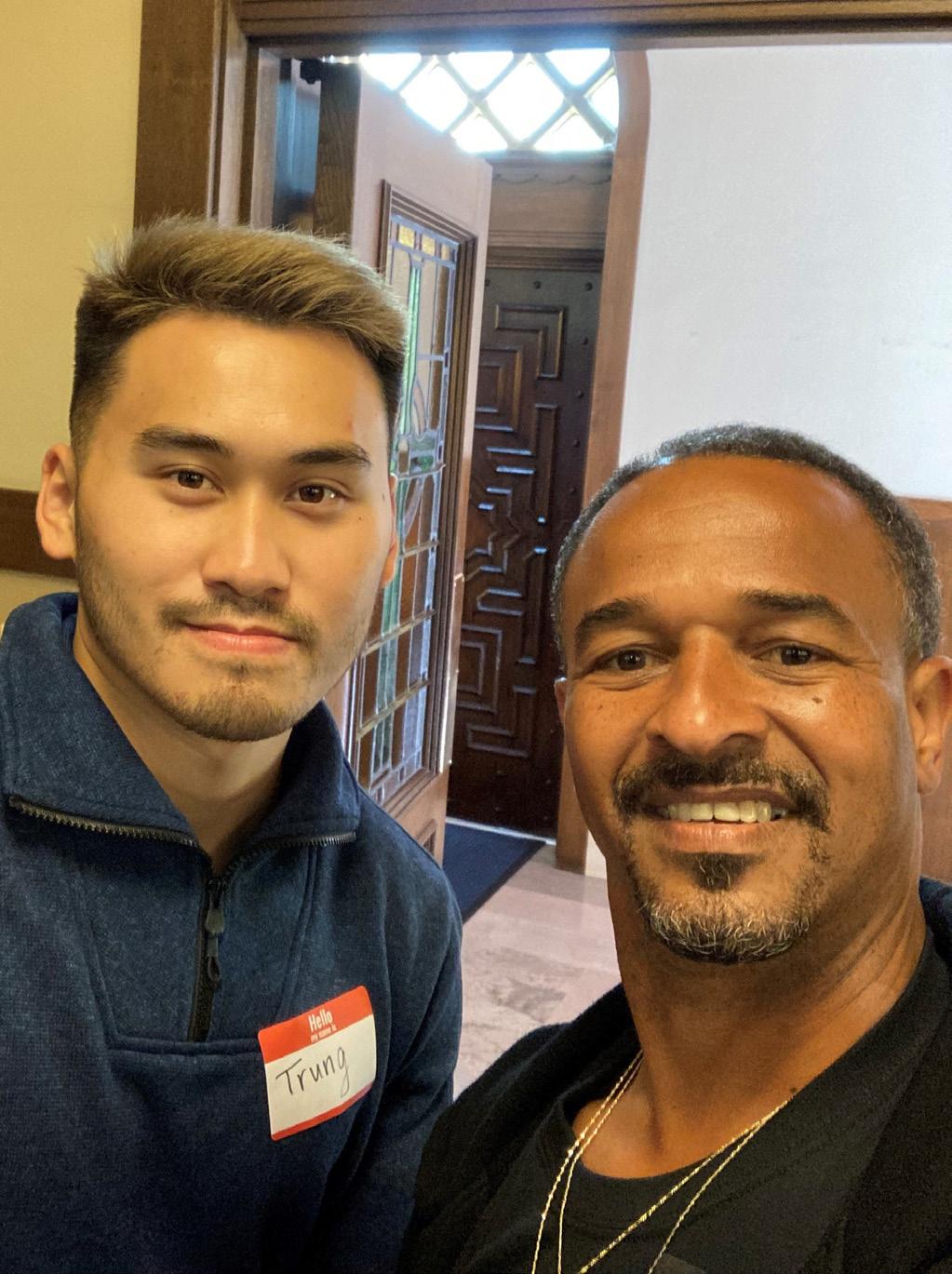
Six months after being released from Youth Authority, Jacky committed what he calls his life crime a crime that results in a life sentence in which someone has lost their life.
Jacky received his 25-year-to life sentence for murdering the cousin of the man who had killed his brother, Mack.
At the time, he says, he was proud of himself.
“I was taught to stick up for my family no matter what. Being sentenced for revenging the death of my brother was nothing for me to sacrifice. It was an opportunity for me to prove myself. And it allowed me to maintain a good state of mind in prison, which is designed to break you.”
While in prison, Jacky became interested in religion.
“I’ve always been a believer,” he says. “However, I did not

follow any particular faith until I reconnected with my spirituality in prison.”
Jacky devoted the first 12 years of his time in prison to reading books on world religions and then writing book reports on them. Gradually, he says, he made a discovery that changed his life.
“I began to realize who I really was,” he says. “I realized that the real me the essence is the spirit. I saw that what I was here for was to evolve spiritually and achieve a spiritual resurrection.”
He also realized that, for most of his life, he had not been true to his real self. He had been playing a role living what he calls a make-believe life in which he thought chasing money, cars, drugs and women was what it was all about.
Reflecting on his life from this new perspective, Jacky had another realization.
Evitar la ley resultó ser problemático. Jacky abandonó la escuela en séptimo grado y empezó a vender drogas. A partir de los 13 años, residió con frecuencia en el centro de menores del condado de Alameda. Tras fugarse dos veces del rancho para chicos del condado, fue condenado a un centro de la Autoridad Juvenil de California a los 18 años.
Seis meses después de ser liberado de la Autoridad Juvenil, Jacky cometió lo que él llama su delito de por vida, un delito que da lugar a una condena de por vida en la que alguien ha perdido la vida.
Jacky recibió su condena de 25 años a cadena perpetua por asesinar al primo del hombre que había matado a su hermano, Mack. “ONE OF MY GOALS IS TO START A TREATMENT PROGRAM THAT HELPS PEOPLE, LIKE MYSELF, UNDERSTAND WHO THEY ARE TO IMPROVE THEIR QUALITY OF LIFE. THE PROGRAM WOULD EMPOWER THEM TO BECOME BETTER PEOPLE AND ENCOURAGE THEM TO GIVE BACK.”
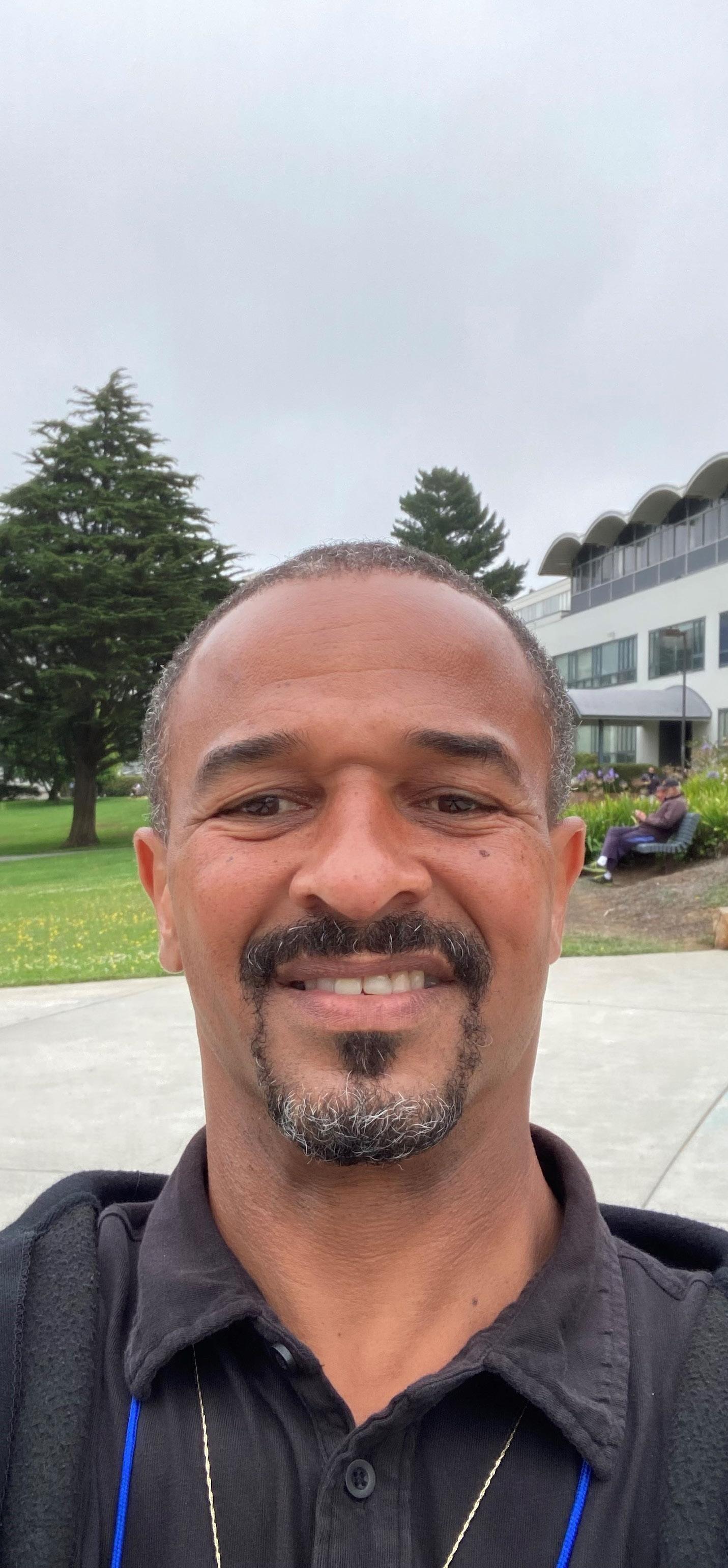
14 Excell Network Magazine | Summer 2022 Issue

“Today I realize that the most horrible decision I ever made was to decide to take that man’s life,” he says.
Following his release from prison in 2020, Jacky made decisions in line with his new priorities. Married and living in Hayward, he now works two jobs while going to school. Through the Project Rebound Program, he enrolled in San Francisco State University, where he is currently taking counseling and psychology classes.
As a San Francisco practitioner for Urban Alchemy, a local nonprofit dedicated to serving the most vulnerable in the Tenderloin and other distressed areas of the city, Jacky works with those suffering from poverty, addiction and mental illness. Many of the staff’s practitioners, like Jacky, are those who have served life sentences and are adept at knowing how to engage with people in stressful situations on the street or in one of Urban Alchemy’s shelters.
He also works as a shelter monitor at Dolores Street Community Services.
“I love it, man,” he says. “It puts me in a position to get the validation and recognition that I longed for as a kid.”
As he looks toward the future, Jacky has plans of creating his own program. Since self-discovery was crucial to his own transformation, he would like to use his experience and education to help others achieve the same realization.
“One of my goals is to start a treatment program that helps people, like myself, understand who they are to improve their quality of life. The program would empower them to become better people and encourage them to give back.”
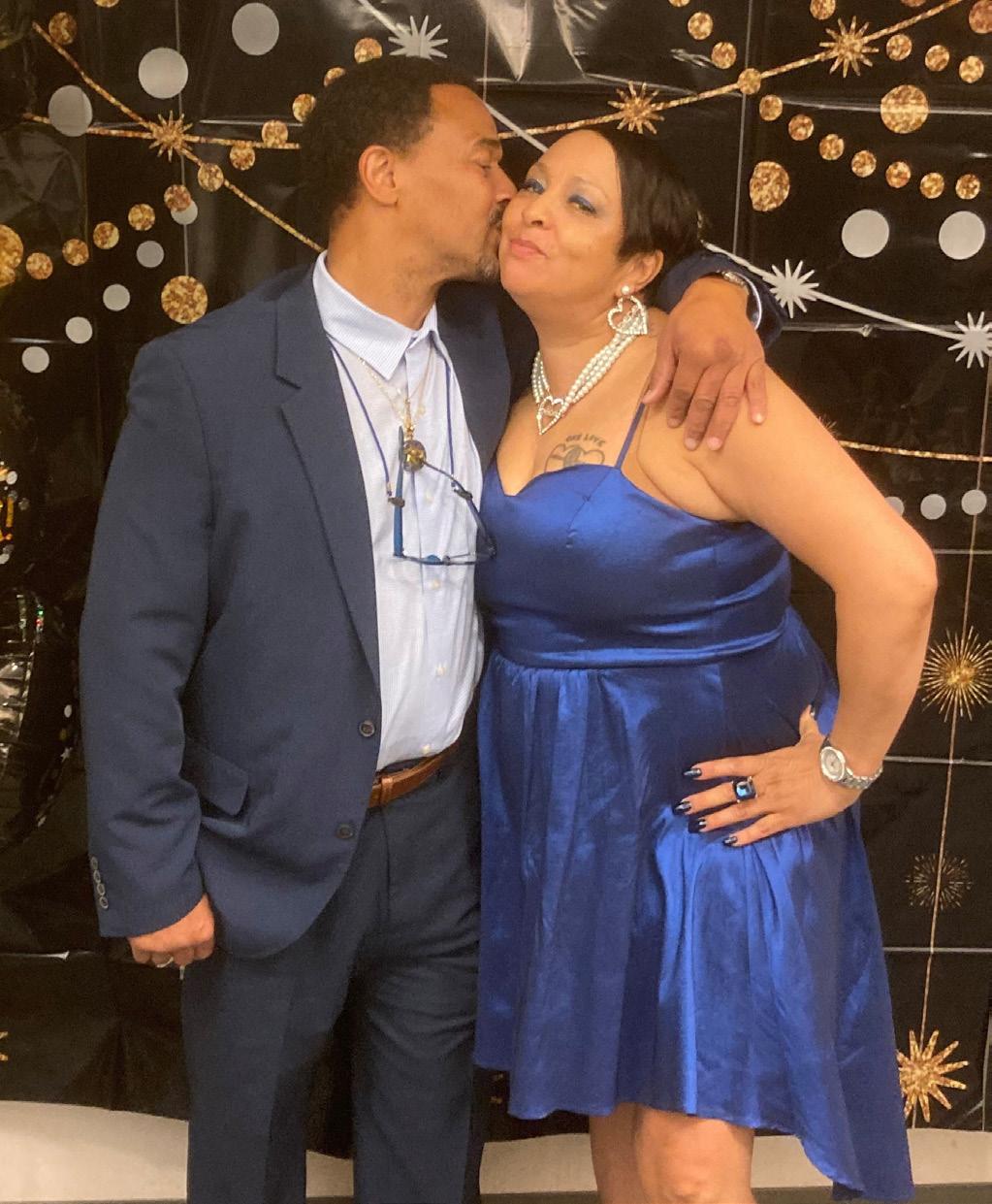
En ese momento, dice, estaba orgulloso de sí mismo.
“Me enseñaron a defender a mi familia pase lo que pase. Ser condenado por vengar la muerte de mi hermano no era nada que tuviera que sacrificar. Fue una oportunidad para probarme a mí mismo. Y me permitió mantener un buen estado de ánimo en la cárcel, que está diseñada para quebrarte”.
Durante su estancia en la cárcel, Jacky se interesó por la religión.
“Siempre he sido creyente”, dice. “Sin embargo, no seguí ninguna fe en particular hasta que me reencontré con mi espiritualidad en la cárcel”.
Jacky dedicó los primeros 12 años de su estancia en prisión a leer libros sobre las religiones del mundo y luego a escribir informes sobre ellos. Poco a poco, dice, hizo un descubrimiento que cambió su vida.
“Empecé a darme cuenta de quién era realmente”, dice. “Me di cuenta de que mi verdadero yo -la esencia- es el espíritu. Vi que para lo que estaba aquí era para evolucionar espiritualmente y lograr una resurrección espiritual.”
También se dio cuenta de que, durante la mayor parte de su vida, no había sido fiel a su verdadero yo. Había estado representando un papel, viviendo lo que él llama una vida ficticia en la que pensaba que perseguir el dinero, los coches, las drogas y las mujeres era lo más importante.
Al reflexionar sobre su vida desde esta nueva perspectiva, Jacky se dio cuenta de otra cosa.
“Hoy me doy cuenta de que la decisión más horrible que he tomado en mi vida ha sido decidir quitarle la vida a ese hombre”, dice.
Tras salir de la cárcel en 2020, Jacky tomó decisiones acordes con sus nuevas prioridades. Casado y viviendo en Hayward, ahora tiene dos trabajos mientras va a la escuela. A través del programa Project Rebound, se matriculó en la Universidad Estatal de San Francisco, donde actualmente toma clases de asesoramiento y psicología.
Como practicante de San Francisco para Urban Alchemy, una organización local sin ánimo de lucro dedicada a atender a los más vulnerables en el Tenderloin y otras zonas deprimidas de la ciudad, Jacky trabaja con quienes sufren pobreza, adicción y enfermedades mentales. Muchos de los profesionales del personal, como Jacky, son personas que han cumplido cadena perpetua y son expertos en saber cómo relacionarse con personas en situaciones de estrés en la calle o en uno de los refugios de Urban Alchemy.
También trabaja como monitor de refugio en Dolores Street Community Services.
“Me encanta”, dice. “Me pone en situación de obtener la validación y el reconocimiento que anhelaba de niño”.
De cara al futuro, Jacky tiene planes de crear su propio programa. Dado que el autodescubrimiento fue crucial para su propia transformación, le gustaría utilizar su experiencia y su formación para ayudar a otros a alcanzar la misma realización.
“Uno de mis objetivos es poner en marcha un programa de tratamiento que ayude a la gente, como yo, a entender quiénes son para mejorar su calidad de vida. El programa les capacitaría para ser mejores personas y les animaría a retribuir”.
15 Excell Network Magazine | Summer 2022 Issue
THE INVESTMENT IN EXCELL NETWORK IS A CONFIRMATION THAT ALL STUDENTS, NO MATTER THEIR PAST, DESERVE THE SAME OPPORTUNITIES TO SUCCEED

BUILDING FOR THE FUTURE
$400-800 SPONSORS
1 Student for 1 Semester
$800-$1200 SPONSORS
1 Student for 2 Semesters
$1200-$2400 SPONSORS
1 Student for 3 semesters


donate at: excellnetwork.org/donate

CAN HELP CHANGE MORE LIVES FOR THE BETTER”
Donate By Check Or Money Order. Please Make Checks Or Money Orders Payable To: Comunidad San Dimas Inc. Attention: Julio Escobar Excell Network Scholarship Stipend 1 Peter Yorke Way San Francisco, CA 94109 We Are A 501(C)(3) Charitable Organization, EIN 90-0750851. All Contributions Are Tax Deductible.
“YOU

















 By Dana Perrigan Writer | Journalist | Book Author
By Dana Perrigan Writer | Journalist | Book Author
















 By Dana Perrigan Writer | Journalist & Book Author
By Dana Perrigan Writer | Journalist & Book Author






